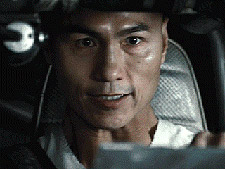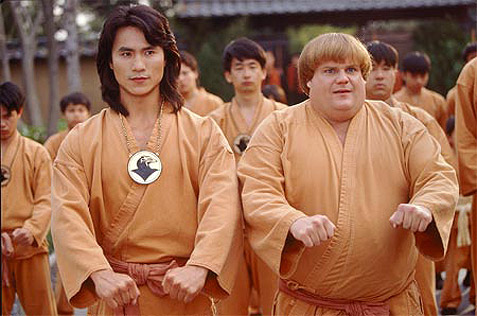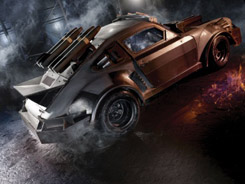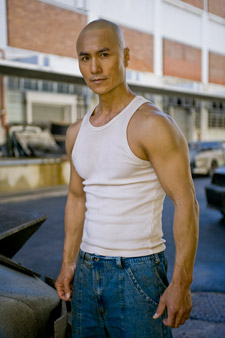
Interview Date: 03/11/2010
Run Date: 01/18/2011
Interviews Home / Movies Home / Bullz-Eye Home
A veteran of Hong Kong action movies before he popped up in 1995's "Mortal Kombat," Robin Shou returns for another round of high-octane action in "Death Race 2" as 14K, the leader of the inmate gang known as The Triads in the Terminal Island penitentiary. While on set in Cape Town, South Africa, we spoke with Shou about whether it's strange to have your character die in one movie only to be asked to return for the sequel ("Death Race 2" is technically a prequel to the 2008 "Death Race") and whether his car really is the best of the Death Race bunch. We also spoke briefly about how the late Chris Farley made Shou feel more comfortable during his first comedic role in 1997's "Beverly Hills Ninja." However, we couldn't get into all of that until we first asked Shou about his potential brush with death while filming a fight scene the previous day, when an unexpectedly swinging iron gate nearly took the actor's head off. As you'll see below, we mean that quite literally.
Reporter: So give us the whole back story to that (situation).
Robin Shou: Well, you know how the whole pressure plate works, right?
Bullz-Eye: Right, right.
RS: You step on it, a weapon is supposed to drop from somewhere.
BE: So clearly you’re getting hosed in that match because nothing is working for you, right?
RS: Exactly. So then I step on that pressure plate and nothing happened. And that’s when Xander charges at me and we do a little fight thing. So I step on it and then act, look up to September like, you screwed me, and then I will react to Xander. So I took a little longer time to react, I mean, look at September (Jones). So I step on it, took a little longer time and that’s when the (gate) dropped down. So what if my reaction was a little quicker? I act and I kind of move....
BE: How close?
RS: It was about less than a foot (from my head).
Reporter: What is the immediate thought after that for you? Like what’s your first reaction?
BE: Well, we saw the first reaction. Arms up in the air and, “what the fuck?”
RS: I said, “What the fuck” and then, “That’s nice.” I think I was nice because, again, I really could die.
Reporter: That’s metal.
RS: I could die from this.
Reporter: It wasn’t slow-mo lowering, it was dropped.
RS: So then I was reacting kind of calm, actually, but I have never been so shaken. Honestly, I mean I’ve done a lot of the Hong Kong action movies, jumped off buildings, run over by cars and stuff like that. I’ve never been so shaken because, again, I have never come this close to death.
Reporter: You’ve done so many stunts. Is that the closest you’ve come, you think? Have there been similar stories?
RS: That is out of control, that is not in my control. A lot of times, when you do stunt work, there are certain things that you kind of expect to happen and then you try to avoid that. But with that, it was just, like, totally out of control.
Reporter: Are you able to kind of quickly recover, calm down from it? Or do you get back to the trailer hours later and go, what the fuck?
RS: I didn’t want to dwell on it too much, but otherwise I couldn’t work. So then I kind of sat for a couple of minutes, just kind of like calm my nerves a little bit. And I knew, again, it’s not that anyone wants anything like that to happen on set. It’s all miscommunication or something. But then, still, it sucks that it happens today. Whoever is up there controlling the gangway, he really didn’t want anything to happen to me either. So thank God, like knock on wood, nothing happened. Everyone is safe.
Reporter: And you’re here now dude.
RS: I’m here! But again, just thinking back, you know it is kind of scary.
BE: Oh absolutely. Like for us, that was the first take we had seen. When it happened, I was like “holy shit, that was close.” Like, I couldn’t believe how close that was, thinking…
Reporter: This guy’s ballsy.
BE: Yeah. And then all of the guys who have been watching everything behind us were like, “Holy fuck, oh my God.” And their reaction, then all of a sudden it was more serious for us.
 RS: You guys didn’t know what was going to happen. You thought that was part of the gag.
RS: You guys didn’t know what was going to happen. You thought that was part of the gag.
BE: I’m, like, I can’t believe how close that came.
RS: Robin Shou, he’s a tough mother fucker. No, that’s why I went “what the fuck?” (Laughs)
BE: Speaking about the stunts, we spoke to the stunt coordinator earlier today and we talked about a lot of guys want to do their own stunts. It’s kind of a back and forth. So I know you do a lot of stunts on your own on this movie. Where’s the line for you?
RS: Well, you know what? I have no problem using stunt men just because that’s what they are there for. And a lot of times when there are certain moves that you want a certain skill, and if I can’t do it I’m not going to go, “I want to do it and hook me up on a wire and I want to fly.” You know, I don’t have that ego because I’ve done it and been there. So there’s a couple of moves, like somersaults, which is more the updated kind of Kemparaj move, which in my time did not exist then. So I didn’t know how to do that stuff, so I said, “Hey, you know what, if there’s a stunt man willing to do it, let them do it.” Otherwise, a lot of time I will do my stuff. Not that I want to prove something, just because it is easier for me, versus having a stunt man come in and then after he did it, I have to come in to do it anyway, again, because you have to repeat the action. So I may as well just do it myself.
Reporter: What’s it like being 14K? Obviously, you’re the only person to come in from the (2008 movie). What do you think you get from that? Are you trying to distance yourself from the first one in terms of the character because it’s a prequel? What are you bringing from that into this one?
RS: I can’t really distance myself because I play the same person. Unless there’s two of them. Because actually there are two 7Ks. (Laughs)
Reporter: What do you think you are able to bring from the first one that other people don’t have, because they weren’t in it?
RS: Well, the first one, all I do is just driving. I’m one of the cons, I was one of the contestants hoping to win the race and get to go free. With this, it’s almost like there’s a…what do you call it? You get to know a personality. You get to know who 14K is.
BE: You get some depth.
RS: Yeah, some depth. And then there’s interaction between me and Luke. Because at the end, he saved my life and in turn I save him. So then there’s, like, a little connection there. I’m kind of like the good guy con in this death race because I haven’t been bought by Sean Bean’s character to kill Luke. Because somehow I’m just not interested. So then there is some kind of depth, some personality into this character. So there is totally a different thing than just driving.
BE: So what’s it like…you die in the first one and then you get to be in the sequel. Like, that doesn’t typically happen.
RS: It doesn’t. (Laughs) Well, I’ll tell you a funny story. Right after the first one…I mean, we did okay at the box office. It wasn’t like amazing numbers and stuff. But we still can’t believe, like, how come it didn’t explode. Just because, how can you go wrong with cars, machine guns and sexy girls? And everyone who saw it thinks the movie’s great. It’s not like “Gone With the Wind” but…
Reporter: It’s “Gone With the Wind” for death cars.
RS: Exactly.
BE: I heard a quote from Danny (Trejo) saying it had three Bs: bullets, boobs and blood.
RS: Exactly. So it’s an entertaining movie. So we all were kind of like scratching our head, like, why didn’t it work? So Paul (W.S. Anderson) was a little disappointed because he put his whole heart into this “Death Race.” And so we were all having dinner one time and he told me that Universal asked him if he was interested in doing a sequel. And he said, “Well, the first one didn’t really work, and then a sequel?” So he wasn’t really…and besides, he was prepping for “Resident Evil 4.” So we’re eating dinner and he told me that Universal approached him and I said, “Yeah, you’re right, but what are you going to do with all of those cars?” He went, “Yeah, what am I going to do with all of those cars?”
Reporter: You were on board from the beginning?
RS: Yeah, kind of. I was in on the idea. So the next day, he wrote a quick treatment and sent it to Universal and they loved it. And they OK’d it. And then he said, “Robin, we’re going to shave your head again.”
BE: So they pitched a sequel and he said, “Well, how about a prequel instead?”
RS: A prequel, exactly.
Reporter: Do you trip over that at all, like, if the movie doesn’t do as well as maybe you think it’s going to do? Does that concern you at all, personally? Are you like, look, I did it and it is what it is.
RS: Well, sometimes, because it’s your craft, you know? It’s almost like you put yourself out there for people to see, for people to judge and a lot of times it has some effect on you. You know, how people react to the movie. So for an artist, you know, considering us actors, directors, whoever in our industry, we’re artists. So when you put out something with all of your heart in it, all of your passion in it and then it didn’t receive well, of course it hurts. I’m always like sad. Like, we all went out on opening night, we didn’t have a premiere, so that was kind of disappointing already. So we all went out to watch the movie in like a regular theater and when we got the number after the first night, it was really disappointing. We stayed up until like 5AM.
Reporter: It’s like, “Beverly Hills Ninja” got screwed over, man. It’s just a cult classic. Like when it came out, people were like…
RS: Exactly, and now it’s a cult classic. And now that Chris (Farley) passed away…. But Chris in general, he’s talented.
BE: I don’t want to shift gears too much, but now that you brought him up, I did want to ask about working with Chris.
RS: Oh man, he was such an awesome dude, I swear to God. I mean, I didn’t know him well because I just came off of “Mortal Kombat” and all of those movies and I flew back to do those movies, so I had never seen “Tommy Boy.”
BE: Oh really?
RS: I had never seen any of his skits on “Saturday Night Live.” So then when people said, “Chris Farley, he is so funny in ‘Tommy Boy,’ I said, “What the hell is that?” Well at first, when they offered me the script, I kind of didn’t want to do it. First of all, I’m against all of those stereotypical type of movies, especially relating to ninjas and martial arts.

BE: Okay.
RS: I said “No, I don’t want to read the script,” and my agents go, “Read the script, man, read the script.”
BE: They’re saying, “It’s a Chris Farley movie!”
RS: Exactly. So I go, “The script is okay, not too bad.” They said, “Why don’t you take a meeting with Chris and the director?” So we met and this little fat dude…and he had kind of like the dark, thick rimmed glasses, and his hair’s kind of spiky, gelled back. And he had this little undone tie with a jacket that doesn’t fit him.
BE: Fat guy in a little coat, essentially.
RS: So then we start talking and I go, man, this guy is honest, meaning he’s very genuine. He’s not trying to be funny, he’s not trying to be anything else; he’s just himself. So when he talks about stuff and about ninjas, and about the martial arts and the discipline, I say, boy, this guy (Haru, Farley’s character) really thinks he’s a true sort of martial artist. He’s not trying to poke fun at the martial arts. He’s not poking fun at the Japanese culture or the ninjas. I mean, this guy really believes that he’s this sort of ninja legend. A boy raised up to be this sort of white ninja. So we started talking and he really believes that and he is so authentic, I go, I think this is kind of cool.
Reporter: He sold you on it, basically.
RS: Exactly. So then I go, “Chris, you know what, you’re going to have to teach me to be funny because I’ve never done a comedy. And then he says, “Dude, you don’t need to be funny, just be yourself.” He said, “As long as you’re honest about the work, people will find you funny.”
BE: There you go.
RS: That’s the advice he gave me. It was just kind of cool because I figure, when you do comedy, you have to act funny. He does very physical comedy so I figure that’s what I need to do. He said, “No man, just be yourself. Be the character.”
Reporter: Can we switch things back to “Death Race”?
RS: Sure.
Reporter: Let’s talk about the vibe in Montreal (where the 2008 “Death Race” was shot) and, obviously, it’s much different. Talk about maybe some of the differences, or similarities, between shooting in South Africa versus shooting in Montreal.
RS: Well, I mean Montreal is the better Canada I heard, from “South Park.”
BE: Oh yeah, the better Canada.
RS: They have like cheese and wine there.
BE: Cheers, buddy.
RS: Well, you know, I don’t know. It’s a bigger movie. Obviously the first “Death Race” we had more money, the sets…and it was the first time seeing all of the cars and machine guns. So it was more sort of impressive, like the first impression was really impressive. And you know, you get all of the amenities, like a cool big, giant crane. And then we had a crane on top of another crane. You know, so Paul is really excited about that because now he can do the shot that he wants. And compared to Cape Town, because we have such a tight schedule and probably…I don’t know how much the budget is, it’s a lot smaller, and the time frame. But I feel the work ethic is still the same. They’re both trying to accomplish the same thing. They both have different challenges. Paul had a lot of money and he needs to figure out how to spend that money. Roel Reiné doesn’t have that much money and now needs to figure out how to shoot a movie with that much money.
Reporter: Does it change your style because it’s a lesser budget, like, things are tighter? Or do you try to approach “Death Race” the same way?
RS: Well, on the first one I had a masseuse. (Laughs) No, just kidding. But no, as an actor it doesn’t really change a thing. You come to do the best work that you can. When we sign on, we knew about the schedule, the money. And because it’s a cool project, still it’s a cool idea. And I’ve seen Roel’s work. I mean, he’s never done like a huge budget movie, but his attitude, his enthusiasm is just really contagious. So then you want to be on board with someone who’s passionate about the work. And for us, we’re like thrill seekers, you know. We’ll go on board with anybody, as long as he’s confident that he’s going to do a good job.
Reporter: Can you talk a little bit about working with Paul versus working with Roel? I know we spoke with Frederick (Koehler) a little earlier and he had said Roel was like the steady cam man, wants to shoot as much; Paul was a little more methodical. What was your experience working with Paul versus working with Roel?
RS: Well, it goes back to the money because Paul had so much money so he gets to do all of those cool shots that he wants to do. You know, the bus driving into the prison in the opening scene, he had a crane on top of a crane because he wanted that looking down. So his mind is more of a creative, painting an image of the prison. And so he’s constantly working on the visual. And versus Roel, again, he’s more practical. Meaning, I need to accomplish these shots and tell a story. So we don’t have the money to do the crane on top of a crane. There are differences, but I feel for us it’s still the same. It doesn’t change. But again, it’s kind of cool to have money to play with and have all of this amazing equipment that Paul had. And again, on Roel, I get to see him go down and dirty. So it’s a different feel. Especially for me, coming from Hong Kong, because I worked in Hong Kong for nine years before I got “Mortal,” you know, that’s how we work in Hong Kong. You know, it’s like down and dirty. There’s no time to reset and redo makeup. You just kind of go and shoot. So I kind of like the energy of Roel versus Paul. Paul is like beauty stuff. Beauty and action and all of that stuff. So there is a difference but basically the work ethic that goes into it is still the same.
Reporter: That’s cool.
BE: So 14K drives a Porsche.
RS: Yeah.
BE: Obviously you have driven that car. Have you driven any of the other ones?
 RS: The others are shit. (Laughs) And I’ve got the best navigator I think.
RS: The others are shit. (Laughs) And I’ve got the best navigator I think.
BE: Yeah? Nice. What’s it like driving that Porsche around?
RS: With her?
BE: Well, let’s do both. By itself and with her.
RS: Well, first, I’ve got to say all of the cars are cool. There’s something about the Porsche because it didn’t lose its shape.
BE: Yeah. It’s still a Porsche, you’re right.
RS: So it’s kind of cool, especially when you have the machine gun in front. Driving with her, the entire car smells nice.
BE: She’s like a life size car freshener.
RS: Exactly.
Reporter: What about during the shooting, since you and Freddy were the only ones from the first movie, would you ever go to (Roel) and be like, “Well, maybe we wouldn’t do it this way.” Did you try to offer up any suggestions or is it more, play your part.
RS: No. I mean, this is Roel’s vision so I leave everything up to Roel. I’m just going to bring what I know of 14K on, and then whatever changes he wants to make, I’ll just do it.
Reporter: Gotcha.
BE: How demanding physically is a role like this?
 RS: What you saw last night, it was hard because, again, go back to the time, because Roel doesn’t have that much time, a lot of time we do a lot of master shots, right? So it’s hard on us. Now you know why I workout three hours a day. It’s getting ready for directors like Roel. So yeah, it was physically demanding. And also, there’s no stunt double. I mean, a lot of time on the wide shot they can fake it by having a stunt double, just kind of go through the motions. But for us, because we’re so tight on schedule, I have to do everything, which is okay. So it was a little physically demanding, but then this is what I do.
RS: What you saw last night, it was hard because, again, go back to the time, because Roel doesn’t have that much time, a lot of time we do a lot of master shots, right? So it’s hard on us. Now you know why I workout three hours a day. It’s getting ready for directors like Roel. So yeah, it was physically demanding. And also, there’s no stunt double. I mean, a lot of time on the wide shot they can fake it by having a stunt double, just kind of go through the motions. But for us, because we’re so tight on schedule, I have to do everything, which is okay. So it was a little physically demanding, but then this is what I do.
BE: I was going to say, most of your roles are probably physically demanding.
Reporter: Following on that, can you compare that with “Mortal Kombat”? How does it relate in terms of which one is more demanding?
RS: You know Paul Anderson shot the first one, right?
Reporter: Yeah.
RS: So when Paul directed the first “Mortal,” when we were doing fight scenes, he wanted master shots too. I swear I was fighting…at the very end fight, where the guys jump out of the holes at the very end, there’s like six guys. I had to fight six guys about 30 times. Fight six guys 30 times, mastery. So then that really killed me a little bit, but we got it done. So after the movie cut, we thought the movie needed more fight scenes. So I don’t know if you guys know this, we went back and added the reptile fight and the scorpion fight.
Reporter: No shit. I didn’t know that.
RS: Yeah, we added the reptile and scorpion and they asked me to be the fight choreographer for those fight scenes. So then I went to Paul and said, “If we’re going to do this right, we’re going to have to like plan it out. We can’t do masters, man, because first of all, you’ll kill the actors, you’ll kill the stunt men. You have to break it up into sections.” So I was doing the story board with Paul, to just kind of break down all of the shots. So then, when we go in, we know exactly which section we needed. And then we do the master shot for something really cool and spectacular, so you get a full frame and full visual of the set and the move. And then, when you go back in, get in tighter for the reaction, all of those Johnny Cage getting hit in the face, those are all inserts.
Reporter: I bet you thought you were done.
BE: I mean you had just fought 180 people. Thirty guys, six times.
RS: I know!
You can follow us on Twitter and Facebook for content updates. Also, sign up for our email list for weekly updates and check us out on Google+ as well.











